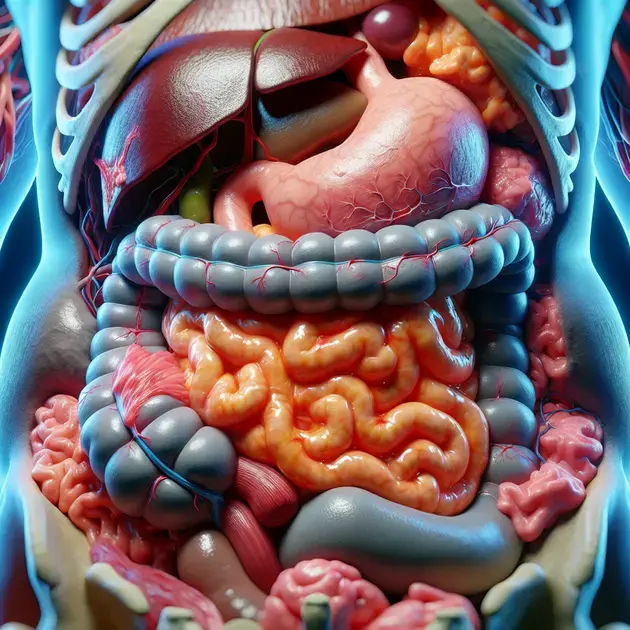When it comes to our health, understanding visceral fat is crucial. This hidden danger, often overlooked, can have serious implications on our well-being. In today’s society, where sedentary lifestyles and poor dietary choices are prevalent, being aware of the risks associated with visceral fat is more important than ever.
Recent studies have shown that excessive accumulation of visceral fat not only affects our physical appearance but also poses a significant threat to our health. Unlike subcutaneous fat, which lies just beneath the skin, visceral fat is stored deep within the abdominal cavity and surrounds vital organs such as the liver, pancreas, and intestines. The presence of high levels of visceral fat has been linked to an increased risk of developing chronic conditions such as heart disease, type 2 diabetes, and even certain types of cancer.

Understanding Visceral Fat: The Silent Killer Within
Visceral fat, also known as abdominal fat, is a dangerous type of fat that surrounds vital organs in the abdominal cavity. Unlike subcutaneous fat (the fat directly under the skin), visceral fat poses serious health risks and is often referred to as the “silent killer within” due to its association with various chronic diseases.
To truly understand visceral fat, it’s essential to know that not all fat is created equal. While some fat is necessary for overall health, excess visceral fat can lead to insulin resistance, inflammation, heart disease, and type 2 diabetes. Monitoring your visceral fat levels is crucial for maintaining good health.
If you’re looking to measure your visceral fat, there are various methods available. One recommended way is through bioelectrical impedance analysis (BIA). Apps like MyFitnessPal can help track your body composition, including visceral fat levels, giving you insights into your health status.
Understanding the dangers of visceral fat is the first step toward a healthier lifestyle. By being aware of your visceral fat levels and taking proactive measures to reduce them, you can significantly lower your risk of developing serious health conditions.
The Health Risks of Excess Visceral Fat
Excess visceral fat is associated with a myriad of health risks that can have serious consequences on your well-being. From an increased risk of cardiovascular diseases to elevated blood pressure and cholesterol levels, the effects of excess visceral fat should not be underestimated.
One way to combat these health risks is by incorporating regular physical activity into your routine. Fitness apps like Fitbit provide personalized workout plans and activity tracking to help you stay active and reduce visceral fat accumulation.
In addition to physical activity, maintaining a balanced diet is crucial for reducing excess visceral fat. Apps like MyPlate offer meal tracking features and nutritional guidance to help you make healthier food choices and manage your weight effectively.
By understanding the health risks associated with excess visceral fat and taking proactive steps to address them, you can protect your overall health and reduce the likelihood of developing chronic diseases in the future.
Tips for Reducing Visceral Fat Naturally
Reducing visceral fat naturally involves a combination of lifestyle changes, including diet modifications and increased physical activity. One effective tip is to focus on high-intensity interval training (HIIT) exercises, which have been shown to specifically target visceral fat.
Apps like Nike Training Club provide HIIT workout routines that you can do from the comfort of your home, making it easier to incorporate regular exercise into your daily schedule and burn excess visceral fat.
In addition to exercise, incorporating more fiber-rich foods into your diet can also help reduce visceral fat levels. Apps like Lose It! offer meal planning tools and food tracking options to help you increase your fiber intake and support your weight loss goals.
By following these tips for reducing visceral fat naturally and utilizing apps to support your journey, you can effectively manage your visceral fat levels and improve your overall health and well-being.

The Impact of Visceral Fat on Your Health
Visceral fat, also known as belly fat, is a type of fat that accumulates around the internal organs in the abdominal cavity. Unlike subcutaneous fat that lies just beneath the skin, visceral fat poses a greater risk to your health. Research has shown that excessive visceral fat is associated with various health conditions such as heart disease, type 2 diabetes, and certain types of cancer.
One of the main reasons why visceral fat is harmful is that it releases harmful substances called cytokines. These substances can increase inflammation in the body, which in turn can lead to insulin resistance and other metabolic issues. Additionally, visceral fat is metabolically active and can affect hormone levels, further contributing to health problems.
To combat the negative impact of visceral fat on your health, it’s important to adopt a healthy lifestyle. This includes a balanced diet, regular exercise, and stress management techniques. By making these changes, you can reduce the amount of visceral fat in your body and improve your overall health.
Understanding the risks associated with visceral fat is crucial for taking proactive steps to mitigate its effects. By focusing on lifestyle changes that target visceral fat specifically, you can lower your risk of developing chronic diseases and improve your quality of life.
Nutrition and Lifestyle Changes to Combat Visceral Fat
When it comes to combating visceral fat, making dietary and lifestyle changes is key. A diet high in processed foods, sugar, and unhealthy fats can contribute to the accumulation of visceral fat. Instead, focus on consuming whole foods such as fruits, vegetables, lean proteins, and whole grains.
Incorporating regular physical activity into your routine is also essential for reducing visceral fat. Aim for a combination of cardiovascular exercise, strength training, and flexibility exercises to target different areas of the body and promote overall fat loss.
Managing stress levels through practices like yoga, meditation, or mindfulness can also help reduce visceral fat. High stress levels trigger the release of cortisol, a hormone that can lead to increased fat storage in the abdominal area. Finding healthy ways to cope with stress is crucial for maintaining a healthy weight.
By making these nutrition and lifestyle changes, you can effectively combat visceral fat and improve your overall health. Remember that consistency is key, and small, sustainable changes over time can lead to significant improvements in your well-being.
Understanding the Science Behind Visceral Fat Gain
Visceral fat gain is influenced by a variety of factors, including genetics, diet, physical activity levels, and hormonal imbalances. Individuals with a genetic predisposition to storing fat in the abdominal area may find it more challenging to reduce visceral fat through lifestyle changes alone.
When you consume excess calories, especially from sugary beverages and high-fat foods, the body stores this energy as fat, often in the visceral region. This leads to an increase in both the size and number of fat cells in the abdominal cavity, contributing to visceral fat gain.
Hormonal imbalances, such as elevated cortisol levels due to chronic stress, can also promote visceral fat accumulation. Cortisol triggers the release of glucose into the bloodstream, which can lead to increased fat storage, particularly in the abdominal area.
Understanding the scientific mechanisms behind visceral fat gain can empower individuals to make informed choices about their lifestyle habits. By addressing the root causes of visceral fat accumulation, such as poor dietary choices and high stress levels, you can work towards reducing visceral fat and improving your overall health.
Conclusion
In conclusion, the impact of visceral fat on health is profound, with significant associations to conditions like heart disease, type 2 diabetes, and certain cancers. The harmful substances released by visceral fat, such as cytokines, contribute to inflammation and metabolic issues, underscoring the urgency of addressing this fat type.
By embracing a healthy lifestyle that includes a balanced diet, regular exercise regimen, and stress management practices, individuals can actively combat the negative effects of visceral fat. Through nutrition and lifestyle changes focused on whole foods, physical activity diversity, and stress reduction techniques like yoga or meditation, the reduction of visceral fat becomes achievable.
Understanding the science behind visceral fat gain, influenced by genetics, diet, physical activity, and hormonal imbalances, empowers individuals to make informed choices. By addressing factors such as excessive calorie consumption and high stress levels triggering cortisol release, the path to reducing visceral fat and enhancing overall health becomes clearer and more attainable.
.